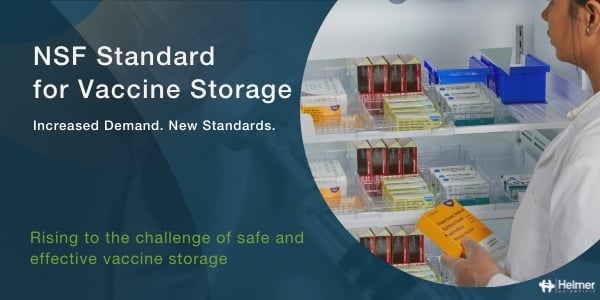Since it was officially issued in May 2021, the NSF/ANSI 456 Vaccine Storage Standard has provided a blueprint for selecting cold-storage equipment used to store temperature-sensitive vaccines.
In the past two years, we have noticed many clinics, hospitals, health departments, and other medical facilities adopting NSF/ANSI 456 certification as a facility-wide requirement for any piece of cold storage equipment used to store vaccines.
What is it?
NSF/ANSI 456 is the first standard of its kind; it sets baseline feature and performance standards for vaccine refrigerators and freezers.
The innovative testing protocol and requirements ensure certified equipment can maintain safe storage temperature for vaccines while in use within the real-world constraints of busy healthcare settings.
How is it achieved?
To achieve NSF/ANSI 456 certification, units must be tested in an approved third-party laboratory. The test protocol includes performance and feature requirements equipment must meet to receive certification.
Just because a manufacturer states units meet standard requirements doesn’t mean the unit is certified. When choosing a vaccine refrigerator or freezer, providers should ensure NSF/ANSI 456 certification has been fully achieved and validated by a third-party laboratory.
To achieve NSF/ANSI 456 certification, units may need to be altered from their standard configuration. For some manufacturers, this includes the addition of a third-party digital data logger with a certification of calibration.
Also, because the temperature requirements for certification are very narrow, some manufacturers may also be required to add partitions and labeling to prevent storage in a section of the refrigerator or freezer that does not meet standard requirements.
When choosing an NSF/ANSI 456 certified unit, it is important to validate the usable capacity compared to the marketed unit capacity because they may be different. Currently, NSF/ANSI 456 certification standards exist for +4°C refrigerators and -30°C freezers.
Other Blogs You Might Be Interested In...
- 5 Best Practices for Proper Vaccine Storage in a Refrigerator, Freezer
- VFC By the Numbers: 30 Years of Protecting Americans Every Day
- 2023 Vaccine Schedule Updates for Adults, Children
- 3 Best Practices to Support Safe Vaccine Administration
Why is it important?
Medical professionals who work with vaccines understand storing vaccines at appropriate temperatures is key to ensuring they remain safe and effective.
Temperature excursions erode vaccine efficacy. Continuous exposure to improper temperatures or, in the case of refrigerated vaccines, exposure to freezing temperatures may render vaccines completely inert.
The WHO estimates that each year up to 50 percent of the global vaccine supply is wasted due to temperature excursions at some point in the cold chain. To put that in perspective, the U.S. government has spent more than $25 billion on COVID-19 vaccines alone, and that number is expected to continue rising through 2025.
While the financial impact of vaccine waste is substantial, the risk to public health is greater. Vaccine waste may contribute to vaccine shortages, especially in rural areas, and administration of improperly stored vaccines may not provide the expected level of protection.
If improperly stored vaccines are administered, patients who received those doses may require revaccination, which requires logistical support to manage.
If you would like to dig deeper into the NSF/ANSI 456 Vaccine Storage Standard, we published a guide outlining how the standard is applied.
NSF/ANSI 456 certification is standard on all GX Solutions Vaccine Refrigerators and Freezers manufactured by Helmer. All certified units carry a “Vaccine Storage Certified | NSF/ANSI 456 Standard” certification label on the front of the unit.
These refrigerators and freezers do not require any additional third-party equipment to maintain certification, and vaccines may be stored anywhere in the cabinet.
To learn more about how this equipment is designed and built to safely store and monitor vaccine inventories in clinical environments, visit our website.





